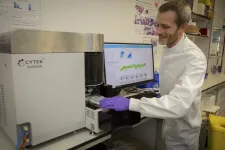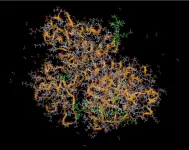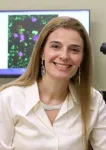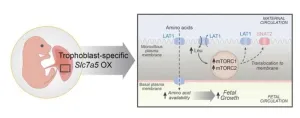(Press-News.org) PHILADELPHIA—The Pew Charitable Trusts today announced the 22 researchers who have been selected to join the Pew Scholars Program in the Biomedical Sciences. These early-career scientists will receive four years of funding to explore some of the most pressing questions in human health and medicine.
“Pew believes that supporting promising early-career researchers is key to scientific innovation, and for nearly 40 years our scholars have helped change the world—creating lifesaving therapies and responding to emerging health crises around the globe,” said Donna Frisby-Greenwood, Pew’s senior vice president for Philadelphia and scientific advancement. “This class of Pew scholars is no different. We are proud to support these scientists and look forward to watching where their research takes them.”
The 2024 class of scholars, all early-career junior faculty, join a community of more than 1,000 scientists who have received awards from Pew since 1985. Current scholars have opportunities to meet annually with fellow Pew-funded scientists to build connections and exchange ideas across a wide variety of disciplines.
“Technological advancements in recent years have transformed science and opened up new, unexplored avenues for discovery,” said Craig C. Mello, Ph.D., a 1995 Pew scholar, 2006 Nobel laureate in physiology or medicine, and chair of the national advisory committee for the scholars program. “This class of scholars represents some of the best and brightest leading the charge, and I’m thrilled to welcome them into Pew’s scientific community.”
Scholars were chosen from 198 applicants nominated by leading academic institutions and researchers across the United States. This year’s class includes scientists who are examining the neural mechanisms that guide learning, investigating the ins and outs of the human genome, and exploring how metabolic changes fuel antibiotic resistance.
Five members of the 2024 class, who were selected for their commitment to investigating health challenges relating to the brain as it ages, will receive awards with support from the Kathryn W. Davis Peace by Pieces Fund.
The 2024 Pew scholars in the biomedical sciences are:
Nicolas Altemose, D.Phil., Ph.D.
Stanford University
Dr. Altemose will investigate how specific proteins help to maintain the function of centromeres, chromosomal structures that play a key role in the process of cell division.
Jesse R. Dixon, M.D., Ph.D.
The Salk Institute for Biological Studies
Dr. Dixon will study how the breakage of chromosomes can lead to changes in gene regulation and genome architecture.
Longhua Guo, Ph.D.
University of Michigan
Dr. Guo will explore the molecular and cellular processes that reverse tissue aging.
Arbel Harpak, Ph.D.
University of Texas at Austin
Dr. Harpak will develop and test new models exploring the drivers of sex differences within both human and animal models.
Rogelio Hernández-López, Ph.D.
Stanford University
Dr. Hernández-López will pioneer novel approaches for designing synthetic protein receptors for engineering cellular communication.
Chi-Min Ho, Ph.D.
Columbia University Irving Medical Center
Dr. Ho aims to determine the molecular architecture and function of the machinery that allows malarial parasites to ingest and break down host cell hemoglobin—the oxygen-carrying molecules in red blood cells needed for survival.
Cholsoon Jang, Ph.D.
University of California, Irvine
Dr. Jang will explore how organs communicate with each other to maintain metabolic health as a uniform entity—and what happens when these regulatory processes go awry.
Xin Jin, Ph.D.
Scripps Research
Dr. Jin will map how genetic variants associated with neuropsychiatric disorders alter the development, circuit organization, and anatomy of neurons across the entire brain.
Ann Kennedy, Ph.D.
Northwestern University
Dr. Kennedy will examine the neural mechanisms that shape an animal’s response to different, competing needs.
Ci Ji Lim, Ph.D.
The University of Wisconsin-Madison
Dr. Lim will investigate the structure of human telomeres—the protective caps made of DNA and protein that safeguard the ends of chromosomes.
Allison Lopatkin, Ph.D.
University of Rochester
Dr. Lopatkin will examine how changes in bacterial metabolism contribute to the development of antibiotic resistance.
Evanna Mills, Ph.D.
Dana-Farber Cancer Institute, Harvard Medical School
Dr. Mills will explore processes controlling the function of macrophages, crucial immune cells that can cause harmful inflammation.
Binyam Mogessie, Ph.D.
Yale University
Dr. Mogessie will unravel the molecular mechanisms that guide proper chromosome segregation during the formation of mature oocytes, cells found in the ovary that eventually become eggs.
Louise Moncla, Ph.D.
University of Pennsylvania
Dr. Moncla will reconstruct how avian influenza viruses accumulate mutations that allow them to jump from birds to humans.
Vijay Mohan K. Namboodiri, Ph.D.
University of California, San Francisco
Dr. Namboodiri will explore the neural mechanisms that guide learning.
James Nuñez, Ph.D.
University of California, Berkeley
Dr. Nuñez will probe the mechanisms by which cells prevent transposable genetic elements from jumping around the genome.
Sara Prescott, Ph.D.
Massachusetts Institute of Technology
Dr. Prescott will study the role that neurons play in remodeling lung tissue after environmental distress.
Silvi Rouskin, Ph.D.
Harvard Medical School
Dr. Rouskin will uncover the intricate structures formed by RNA inside cells.
Devin Schweppe, Ph.D.
University of Washington
Dr. Schweppe will catalog how drugs interact with all of the proteins within cells.
Clare Smith, Ph.D.
Duke University
Dr. Smith will examine how microbial and host factors contribute to the severity of tuberculosis.
Claudia Vásquez, Ph.D.
University of Washington
Dr. Vásquez will investigate the cellular and molecular mechanisms that shape the construction of a functional organ.
Meg Younger, Ph.D.
Boston University
Dr. Younger will explore whether mosquitoes are more attracted to babies than to their parents.
Founded in 1948, The Pew Charitable Trusts uses data to make a difference. Pew addresses the challenges of a changing world by illuminating issues, creating common ground, and advancing ambitious projects that lead to tangible progress.
END
Scientists at the University of Cambridge have discovered that a type of white blood cell - called a regulatory T cell - exists as a single large population of cells that constantly move throughout the body looking for, and repairing, damaged tissue.
This overturns the traditional thinking that regulatory T cells exist as multiple specialist populations that are restricted to specific parts of the body. The finding has implications for the treatment of many different diseases – because almost all diseases and injuries trigger the body’s immune system.
Current anti-inflammatory drugs treat the whole ...
PHILADEPHIA—The Pew Charitable Trusts and the Alexander and Margaret Stewart Trust announced today the 2024 class of the Pew-Stewart Scholars for Cancer Research, five early-career scientists who will each receive four-year grants to explore new avenues in cancer development, diagnosis, and treatment. This is the 11th year the Alexander and Margaret Stewart Trust has partnered with Pew to cultivate a legacy of cutting-edge cancer research.
“Despite decades of groundbreaking research and innovative breakthroughs, millions of Americans are still all too familiar with the devastation and uncertainty of a cancer diagnosis,” ...
PHILADELPHIA—The Pew Charitable Trusts today announced the 2024 class of the Pew Latin American Fellows Program in the Biomedical Sciences.
The 10 postdoctoral fellows from six Latin American countries—Argentina, Brazil, Chile, Cuba, Mexico, and Peru—will receive two years of funding to conduct research in laboratories across the United States. They will work under the mentorship of prominent biomedical scientists, including alumni from the Latin American fellows program and the Pew Scholars Program in the Biomedical Sciences.
“The grave threats to human health over the past few years—from COVID-19 to growing rates of cancer in younger adults—underscore ...
Thanks to the combined computing power of Amazon Web Services (AWS) and Intel, the CCDC announces that a potentially significant advancement in drug discovery has been achieved. A curated data set of protein structures from the Protein Data Bank (PDB) with predicted hydrogen positions is now available for download. This project was supported by an Intel RISE Technology Initiative contribution.
Historically, collaborations with the pharmaceutical industry have enabled the development of reliable methods for interpreting interactions within protein binding sites using proprietary information not publicly available. Repeating these studies ...
Renal tumor pathology has evolved considerably, expanding from two main types of renal malignant tumors to over 20 distinct types. Diagnostic criteria have advanced from purely morphological features to include histochemistry, immunohistochemistry (IHC), and molecular genetics. The World Health Organization (WHO) and the International Society of Urologic Pathology (ISUP) have been instrumental in updating these criteria, resulting in a comprehensive framework essential for accurate diagnosis, effective treatment, and improved patient outcomes.
The field of renal tumor pathology has undergone ...
A new paper from an interdisciplinary team at MUSC Hollings Cancer Center describes how the bacteria Porphyromonas gingivalis interferes with chemotherapy-induced mitophagy, allowing oral cancer tumors to become resistant to the drug’s effects.
Besim Ogretmen, Ph.D., SmartState Endowed Chair in Lipidomics and Drug Discovery in the College of Medicine, and Ӧzlem Yilmaz, D.D.S., Ph.D., a professor, clinician-scientist and microbiologist in the College of Dental Medicine, worked with graduate ...
In late 2019 the previously unremarkable galaxy SDSS1335+0728 suddenly started shining brighter than ever before. To understand why, astronomers have used data from several space and ground-based observatories, including the European Southern Observatory’s Very Large Telescope (ESO’s VLT), to track how the galaxy’s brightness has varied. In a study out today, they conclude that they are witnessing changes never seen before in a galaxy — likely the result of the sudden awakening of the massive black hole at its core.
“Imagine you’ve been observing a distant galaxy for years, and it always seemed calm and inactive,” ...
Gastrointestinal (GI) cancers, encompassing esophageal, gastric, small bowel, and colorectal carcinomas, represent a significant global health burden due to their high incidence and mortality rates. This review by M. Jesús Fernández-Aceñero et al. provides an in-depth analysis of the molecular characteristics, prognosis, and current therapeutic strategies for these malignancies, highlighting the latest advancements and challenges in the field.
Esophageal carcinoma is among the ten most prevalent tumors globally, with squamous cell carcinoma (SCC) being the most common subtype. ...
COLUMBUS, Ohio – Discovering that hepatitis E virus is associated with sperm in pigs suggests the virus may be both sexually transmitted and linked to male infertility, according to a new study.
Hepatitis E (HEV) is the leading cause of the acute viral liver infection in humans worldwide, mostly in developing regions where sanitation is poor. The virus is also endemic in pigs in the United States – though it is present mostly in organs rather than muscle, and is killed when the meat is cooked.
Because HEV has been linked to fatal pregnancy complications and reports of male infertility ...
Common complications of pregnancy affecting fetal size may be caused by irregularities in the transport of amino acids across the placenta—a finding with therapeutic implications. Intrauterine growth restriction (IUGR) and fetal overgrowth affect 15-20% of pregnancies worldwide. Abnormal fetal growth is strongly linked to the development of obesity, diabetes, and cardiovascular disease in later life. Placental transport of essential amino acids is decreased in human IUGR and increased in fetal overgrowth, but whether this was a cause or consequence was unclear. Fredrick Rosario-Joseph and colleagues created a line of mice ...




